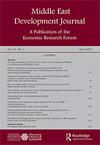Overeducation wage penalty for university graduates: evidence from the MENA region using machine learning techniques
IF 0.9
Q4 DEVELOPMENT STUDIES
引用次数: 0
Abstract
ABSTRACT This study estimates the causal effect of overeducation on wages using cross-sectional survey data from three countries in the Middle East and North Africa region. The Labour Market Panel Survey data from Jordan in 2016, Tunisia in 2014, and Egypt in 2012 and 2018 are used. Overeducation occurs when an individual works in a job that requires someone with less education. Our analysis focuses on employees with high school or college education in paid-wage jobs. Overeducation in the data is self-reported. Between 10% and 50% of the samples in the various countries are overeducated, with overeducation being more pronounced among high school than college-educated people. The novel causal forest method as well as the nearest neighbour and propensity score matching methods are used to estimate the over-education wage penalty. The overeducation job mismatch wage penalty is significant in both total wage and basic wage. The size of the penalty, however, varies considerably between the three countries and is negatively associated with the prevalence of overeducation in the job market in each country. The penalty in total wage ranges from 17% in Egypt in 2012 to approximately 50% in Tunisia. High school graduates have smaller penalties. We recommend policies such as conducting more active labour market programmes to reduce the stock of mismatched workforce, enhancing job search services to improve the quality of matching in new vacancies, and following strategies that motivate entrepreneurship.对大学毕业生的过度教育工资惩罚:来自中东和北非地区使用机器学习技术的证据
摘要本研究利用中东和北非地区三个国家的横断面调查数据,估计了过度教育对工资的因果影响。使用了约旦2016年、突尼斯2014年以及埃及2012年和2018年的劳动力市场小组调查数据。当一个人从事的工作需要受教育程度较低的人时,就会出现过度教育。我们的分析侧重于从事带薪工作的受过高中或大学教育的员工。数据中的过度教育是自我报告的。在各个国家,10%至50%的样本受过过度教育,高中生的过度教育比受过大学教育的人更为明显。采用新的因果森林法以及最近邻法和倾向得分匹配法来估计超教育工资惩罚。教育程度过高的岗位错配工资惩罚在总工资和基本工资中都很显著。然而,这三个国家的处罚幅度差异很大,并且与每个国家就业市场上普遍存在的过度教育呈负相关。总工资中的罚款从2012年埃及的17%到突尼斯的约50%不等。高中毕业生的处罚较小。我们建议采取一些政策,如开展更积极的劳动力市场计划,以减少不匹配劳动力的存量,加强求职服务,以提高新职位的匹配质量,以及采取激励创业的战略。
本文章由计算机程序翻译,如有差异,请以英文原文为准。
求助全文
约1分钟内获得全文
求助全文

 求助内容:
求助内容: 应助结果提醒方式:
应助结果提醒方式:


